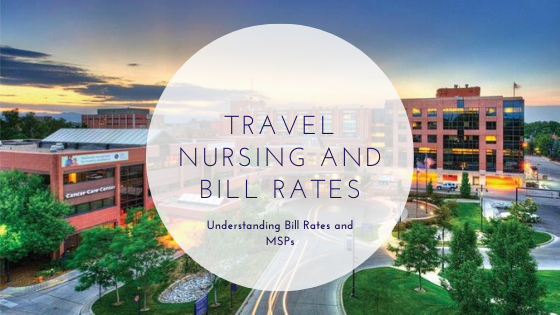

I use the terms in the title of this article in past posts when referring to travel nursing pay and job availability. It is important to understand what these terms mean when negotiating a travel nurse contract.
What is the bill rate?
The bill rate is the total amount of money that the travel nurse agency is receiving from the facility for supplying a travel nurse. It is a topic usually avoided by agencies and travel nurses because it can be misperceived that the agency is “ripping off” the travel nurse.
This amount must cover the pay package for the nurse, pay for the travel nurse agency and recruiter, and any applicable ‘vendor’ fees which refer to money charged by the managed service provider (MSP- see below). The bill rate may be standardized, negotiated, or bid on.
Standardized bill rates are common and mean that the hospital gives the same amount of money per nurse to each agency no matter what the nurses’ experience or which agency is providing the service. Standardized bill rates may have subcategories of pay for specialties, crisis situations, or overtime.
Negotiated bill rates are less frequent and imply that the travel nursing agencies can seek additional money if the travel nurse has more experience or a higher in-demand specialty.
Bill rates that are bid on pin travel nursing agencies against each other and the facility usually goes with the agency with the most affordable pay package. This type of situation is most unfortunate for travel nursing because the hospital will always go with the lowest rate.
Not all bill rates are created equal. A rate may vary from hospital to hospital in the same city. Agencies try to focus on packages with higher bill rates (you make more money= they make more money), and the reality is they obviously have to take some money in order to stay in business. The bill rate helps pay for your benefits, licensing fees, bonuses, and every other bit of cash that is needed to put you through a successful travel nursing assignment.


Bill rates are not usually divulged to travelers, and your recruiter isn’t trying to be secretive or spiteful. Travel nursing agencies aren’t supposed to provide a breakdown of wages due to IRS rules. That is why we are offered a ‘blended rate’. Additionally, if a travel nurse isn’t willing to see how much it costs to employ them and where the extra money is being applied to, they may be angry that it seems to be much more than what they are actually making. Your travel nursing agency tries to take as low of a margin as possible, but it would be impossible to provide their services for free.
Research travel nursing agencies and pay rates with NurseFly
What is an MSP ?
A managed service provider is a company that has a contract with a facility or healthcare system to provide them with supplemental staff. Hospitals don’t work with every travel nursing agency individually, but rather a few large companies that work with the smaller agencies on behalf of the facility. Major firms offering the MSP model include AMN Healthcare & Cross Country Healthcare. These MSPs work directly with a hospital or healthcare system. Which means all the staffing for that hospital is done through one MSP. That doesn’t necessarily mean you have to work for that entity. You may work for an a smaller sister agency, or ‘sub-vendor’, that is helping to staff the facilities. The larger travel nursing agencies are often MSPs and often have their own staffing network. As you can imagine there’s a few layers here taking a cut of the pie, so thats why it’s important to shop around and compare assignments and agencies to ensure you are getting the best combination of pay and benefits for you.
MSPs can help streamline the on-boarding process for a hospital. They often work closely with the facilities to understand their needs and what they are looking for in a travel nurse.
Working as a 1099 RN
You may have heard of travel nurses working as ‘independent contractors’ or ‘1099’ employees. This means the nurse is hired by the facility or staffing agency as what is commonly referred to as a freelance nurse. I wouldn’t recommend this option to first time travelers because you are often responsible for much more of the application and documentation submission process than you would be with a travel nursing agency. Additionally, many facilities do not accommodate ‘1099’ travel nurses for employment.
While the idea of working an ‘independent contractor’ sounds lucrative and appealing, it isn’t realistically possible for us. Being an independent contractor would mean being able to write off our own expenses and essentially ‘cutting out the middleman’ of the travel nurse agency. So, this means nurses would be responsible for all of the documentation submission and setting up the whole on-boarding process.
Finally, due to the wording of the IRS definition of an independent contractor, 1099 work isn’t legally possible for RNs in most specialties. In summary, the rule says that because the facility that employs the travel nurse defines the way the nursing job must be done (policies and protocols), nurses cannot work as 1099 employees. According to the IRS, the payer (hospital) cannot direct how or what will be done, but only the result. Since nurses aren’t given free rein to do their job however they see fit, they do not qualify for 1099 employment.
Stay Informed!
-RNRN




Very informative
Thanks
BE SAFE